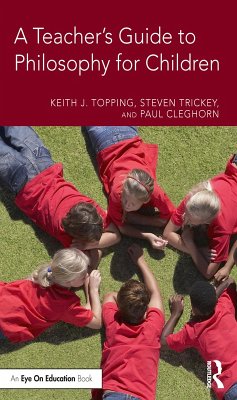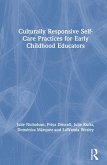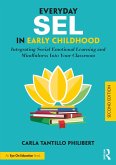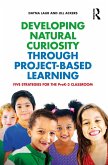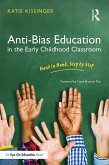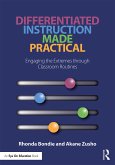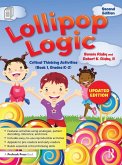Keith J. Topping, Steven Trickey, Paul Cleghorn
A Teacher's Guide to Philosophy for Children (eBook, ePUB)
30,95 €
30,95 €
inkl. MwSt.
Sofort per Download lieferbar

15 °P sammeln
30,95 €
Als Download kaufen

30,95 €
inkl. MwSt.
Sofort per Download lieferbar

15 °P sammeln
Jetzt verschenken
Alle Infos zum eBook verschenken
30,95 €
inkl. MwSt.
Sofort per Download lieferbar
Alle Infos zum eBook verschenken

15 °P sammeln
Keith J. Topping, Steven Trickey, Paul Cleghorn
A Teacher's Guide to Philosophy for Children (eBook, ePUB)
- Format: ePub
- Merkliste
- Auf die Merkliste
- Bewerten Bewerten
- Teilen
- Produkt teilen
- Produkterinnerung
- Produkterinnerung

Bitte loggen Sie sich zunächst in Ihr Kundenkonto ein oder registrieren Sie sich bei
bücher.de, um das eBook-Abo tolino select nutzen zu können.
Hier können Sie sich einloggen
Hier können Sie sich einloggen
Sie sind bereits eingeloggt. Klicken Sie auf 2. tolino select Abo, um fortzufahren.

Bitte loggen Sie sich zunächst in Ihr Kundenkonto ein oder registrieren Sie sich bei bücher.de, um das eBook-Abo tolino select nutzen zu können.
A Teacher's Guide to Philosophy for Children provides educators with the process and structures to engage children in inquiring as a group into 'big' moral, ethical, and spiritual questions, while also considering curricular necessities and the demands of national and local standards.
- Geräte: eReader
- ohne Kopierschutz
- eBook Hilfe
- Größe: 0.72MB
Andere Kunden interessierten sich auch für
![Culturally Responsive Self-Care Practices for Early Childhood Educators (eBook, ePUB) Culturally Responsive Self-Care Practices for Early Childhood Educators (eBook, ePUB)]() Julie NicholsonCulturally Responsive Self-Care Practices for Early Childhood Educators (eBook, ePUB)30,95 €
Julie NicholsonCulturally Responsive Self-Care Practices for Early Childhood Educators (eBook, ePUB)30,95 €![Everyday SEL in Early Childhood (eBook, ePUB) Everyday SEL in Early Childhood (eBook, ePUB)]() Carla Tantillo PhilibertEveryday SEL in Early Childhood (eBook, ePUB)30,95 €
Carla Tantillo PhilibertEveryday SEL in Early Childhood (eBook, ePUB)30,95 €![A Teacher's Guide to Philosophy for Children (eBook, PDF) A Teacher's Guide to Philosophy for Children (eBook, PDF)]() Keith J. ToppingA Teacher's Guide to Philosophy for Children (eBook, PDF)30,95 €
Keith J. ToppingA Teacher's Guide to Philosophy for Children (eBook, PDF)30,95 €![Developing Natural Curiosity through Project-Based Learning (eBook, ePUB) Developing Natural Curiosity through Project-Based Learning (eBook, ePUB)]() Dayna LaurDeveloping Natural Curiosity through Project-Based Learning (eBook, ePUB)30,95 €
Dayna LaurDeveloping Natural Curiosity through Project-Based Learning (eBook, ePUB)30,95 €![Anti-Bias Education in the Early Childhood Classroom (eBook, ePUB) Anti-Bias Education in the Early Childhood Classroom (eBook, ePUB)]() Katie KissingerAnti-Bias Education in the Early Childhood Classroom (eBook, ePUB)30,95 €
Katie KissingerAnti-Bias Education in the Early Childhood Classroom (eBook, ePUB)30,95 €![Differentiated Instruction Made Practical (eBook, ePUB) Differentiated Instruction Made Practical (eBook, ePUB)]() Rhonda BondieDifferentiated Instruction Made Practical (eBook, ePUB)30,95 €
Rhonda BondieDifferentiated Instruction Made Practical (eBook, ePUB)30,95 €![Lollipop Logic (eBook, ePUB) Lollipop Logic (eBook, ePUB)]() Bonnie RisbyLollipop Logic (eBook, ePUB)13,95 €
Bonnie RisbyLollipop Logic (eBook, ePUB)13,95 €-
-
-
A Teacher's Guide to Philosophy for Children provides educators with the process and structures to engage children in inquiring as a group into 'big' moral, ethical, and spiritual questions, while also considering curricular necessities and the demands of national and local standards.
Dieser Download kann aus rechtlichen Gründen nur mit Rechnungsadresse in A, B, BG, CY, CZ, D, DK, EW, E, FIN, F, GR, HR, H, IRL, I, LT, L, LR, M, NL, PL, P, R, S, SLO, SK ausgeliefert werden.
Produktdetails
- Produktdetails
- Verlag: Taylor & Francis eBooks
- Seitenzahl: 190
- Erscheinungstermin: 11. Juni 2019
- Englisch
- ISBN-13: 9780429687150
- Artikelnr.: 56962128
- Verlag: Taylor & Francis eBooks
- Seitenzahl: 190
- Erscheinungstermin: 11. Juni 2019
- Englisch
- ISBN-13: 9780429687150
- Artikelnr.: 56962128
- Herstellerkennzeichnung Die Herstellerinformationen sind derzeit nicht verfügbar.
Keith J. Topping is Professor at the University of Dundee, UK.
Steven Trickey is Scholar in Residence at American University, USA.
Paul Cleghorn is an education consultant at Aude Education, UK.
Steven Trickey is Scholar in Residence at American University, USA.
Paul Cleghorn is an education consultant at Aude Education, UK.
1. Introducing Thinking Through Philosophy For Whom Is This Book Written? Clarifying the Term `Philosophy for Children
Teachers `Making a Difference
Through Philosophical Inquiry Philosophical Inquiry: Both `Practical
and `Evidence Based
A Psychological and Educational Perspective on a Philosophical Process The Structure of This Book References 2. Aims and Process of Philosophy for Children What is Philosophy for Children? What Makes an Inquiry Philosophical? What Are the Aims of Philosophy for Children? What Skills, Attitudes and Knowledge Do Teachers Need to Facilitate Inquiries? Are Children Capable of Philosophical Thinking? Developing Teachers
Facilitation Skills Does Inquiry Need to Be Philosophical? Infusing Philosophical Inquiry into Other Subjects Space for Philosophy for Children in a Crowded Curriculum What This Chapter Has Been About References Chapter 3: From Theory into Practice The Need for a Structure What is Philosophical Inquiry in Practical Terms? What is a Community of Inquiry? The Rational and Moral Dimensions Skillful Questioning Useful Strategies for Building the Inquiry Thinking Development, Emotional Intelligence and Spiritual Intelligence The Seven Steps to Philosophical Inquiry: Lesson Plan The Three Stages of Development Making a Start What about Kindergarten? Sample Themes What Next? Route Map for Introducing P4C Through TTP References 4. From Small to Large: Different Contexts for Philosophical Inquiry Lunch Club/After-School Club A Single Class Whole School Beacon School The School District Program External Provision of P4C College and Community Summary References 5. How Inquiry Promotes More Effective Learning How Philosophical Inquiry Improves Learning How Teachers Can Support Students Construct Their Thinking and Learning Transfer Across Subject Boundaries and Beyond Challenging Themes: An Example Beyond the Curriculum Higher Order Thinking Communities Support Learning Theoretical Perspectives Summary References 6. Educating Students to Think: The Contribution of Philosophical Inquiry What Are Some of the Issues Around Teaching Thinking? Why Promote Thinking and Problem Solving in the Classroom? Critical Thinking Which Students Do We Teach to Think? An Introduction to Logical Reasoning Skills Creative Thinking Intelligent Students! The Challenge of Thinking References 7. Communication, Dialogue and Social/Emotional Development Thought and Feeling Are Inseparable Can Philosophical Inquiry Help Re-Educate Emotions? Parallels Between Philosophical Inquiry and `Cognitive Behavioral Therapy
Participation, Communication and Social Wellbeing Communication in the Classroom Improving Communication and Dialogue in the Classroom Summary References 8. Does P4C Work? Evaluation Research Why Evaluate the Effectiveness of Thinking Programs? Placing Philosophy for Children Within Thinking Skills Interventions Early Evaluation Studies of Philosophy for Children Systematic Reviews of Philosophy for Children Evaluation of the Thinking Through Philosophy Program What Research Methods Are Best for Evaluating Effects of Philosophy for Children? Sustainability Overall Conclusions About the Effects of Philosophy for Children References 9. Evaluating Philosophical Inquiry Participant Perceptions Observation Research Design Measures Generalization and Maintenance Analysis of Data Evaluation Results Feedback and Dissemination References 10. Truth, Democracy and Classroom Communities of Inquiry Is Truth Problematic? Should Teachers Be Concerned? Is There a Threat to Healthy Democracies? Conspiracy Theorists and What Is Truth Historical Concerns Over Truth Concerns About Truth in Other Countries What Can Be Done? Cognitive Biases Complicate `Truth
Overcoming Bias A Brief Note on Philosophical Ideas About Truth Concluding Comments on Participation and Democracy References 11. Lessons Learned in Sustaining and Embedding An Example What You Need to Do Habits and Dispositions Cost-Effectiveness Cautionary Tales: Sustaining over Time Skills for the World Skills for the Future Final Thoughts
Teachers `Making a Difference
Through Philosophical Inquiry Philosophical Inquiry: Both `Practical
and `Evidence Based
A Psychological and Educational Perspective on a Philosophical Process The Structure of This Book References 2. Aims and Process of Philosophy for Children What is Philosophy for Children? What Makes an Inquiry Philosophical? What Are the Aims of Philosophy for Children? What Skills, Attitudes and Knowledge Do Teachers Need to Facilitate Inquiries? Are Children Capable of Philosophical Thinking? Developing Teachers
Facilitation Skills Does Inquiry Need to Be Philosophical? Infusing Philosophical Inquiry into Other Subjects Space for Philosophy for Children in a Crowded Curriculum What This Chapter Has Been About References Chapter 3: From Theory into Practice The Need for a Structure What is Philosophical Inquiry in Practical Terms? What is a Community of Inquiry? The Rational and Moral Dimensions Skillful Questioning Useful Strategies for Building the Inquiry Thinking Development, Emotional Intelligence and Spiritual Intelligence The Seven Steps to Philosophical Inquiry: Lesson Plan The Three Stages of Development Making a Start What about Kindergarten? Sample Themes What Next? Route Map for Introducing P4C Through TTP References 4. From Small to Large: Different Contexts for Philosophical Inquiry Lunch Club/After-School Club A Single Class Whole School Beacon School The School District Program External Provision of P4C College and Community Summary References 5. How Inquiry Promotes More Effective Learning How Philosophical Inquiry Improves Learning How Teachers Can Support Students Construct Their Thinking and Learning Transfer Across Subject Boundaries and Beyond Challenging Themes: An Example Beyond the Curriculum Higher Order Thinking Communities Support Learning Theoretical Perspectives Summary References 6. Educating Students to Think: The Contribution of Philosophical Inquiry What Are Some of the Issues Around Teaching Thinking? Why Promote Thinking and Problem Solving in the Classroom? Critical Thinking Which Students Do We Teach to Think? An Introduction to Logical Reasoning Skills Creative Thinking Intelligent Students! The Challenge of Thinking References 7. Communication, Dialogue and Social/Emotional Development Thought and Feeling Are Inseparable Can Philosophical Inquiry Help Re-Educate Emotions? Parallels Between Philosophical Inquiry and `Cognitive Behavioral Therapy
Participation, Communication and Social Wellbeing Communication in the Classroom Improving Communication and Dialogue in the Classroom Summary References 8. Does P4C Work? Evaluation Research Why Evaluate the Effectiveness of Thinking Programs? Placing Philosophy for Children Within Thinking Skills Interventions Early Evaluation Studies of Philosophy for Children Systematic Reviews of Philosophy for Children Evaluation of the Thinking Through Philosophy Program What Research Methods Are Best for Evaluating Effects of Philosophy for Children? Sustainability Overall Conclusions About the Effects of Philosophy for Children References 9. Evaluating Philosophical Inquiry Participant Perceptions Observation Research Design Measures Generalization and Maintenance Analysis of Data Evaluation Results Feedback and Dissemination References 10. Truth, Democracy and Classroom Communities of Inquiry Is Truth Problematic? Should Teachers Be Concerned? Is There a Threat to Healthy Democracies? Conspiracy Theorists and What Is Truth Historical Concerns Over Truth Concerns About Truth in Other Countries What Can Be Done? Cognitive Biases Complicate `Truth
Overcoming Bias A Brief Note on Philosophical Ideas About Truth Concluding Comments on Participation and Democracy References 11. Lessons Learned in Sustaining and Embedding An Example What You Need to Do Habits and Dispositions Cost-Effectiveness Cautionary Tales: Sustaining over Time Skills for the World Skills for the Future Final Thoughts
1. Introducing Thinking Through Philosophy For Whom Is This Book Written? Clarifying the Term `Philosophy for Children
Teachers `Making a Difference
Through Philosophical Inquiry Philosophical Inquiry: Both `Practical
and `Evidence Based
A Psychological and Educational Perspective on a Philosophical Process The Structure of This Book References 2. Aims and Process of Philosophy for Children What is Philosophy for Children? What Makes an Inquiry Philosophical? What Are the Aims of Philosophy for Children? What Skills, Attitudes and Knowledge Do Teachers Need to Facilitate Inquiries? Are Children Capable of Philosophical Thinking? Developing Teachers
Facilitation Skills Does Inquiry Need to Be Philosophical? Infusing Philosophical Inquiry into Other Subjects Space for Philosophy for Children in a Crowded Curriculum What This Chapter Has Been About References Chapter 3: From Theory into Practice The Need for a Structure What is Philosophical Inquiry in Practical Terms? What is a Community of Inquiry? The Rational and Moral Dimensions Skillful Questioning Useful Strategies for Building the Inquiry Thinking Development, Emotional Intelligence and Spiritual Intelligence The Seven Steps to Philosophical Inquiry: Lesson Plan The Three Stages of Development Making a Start What about Kindergarten? Sample Themes What Next? Route Map for Introducing P4C Through TTP References 4. From Small to Large: Different Contexts for Philosophical Inquiry Lunch Club/After-School Club A Single Class Whole School Beacon School The School District Program External Provision of P4C College and Community Summary References 5. How Inquiry Promotes More Effective Learning How Philosophical Inquiry Improves Learning How Teachers Can Support Students Construct Their Thinking and Learning Transfer Across Subject Boundaries and Beyond Challenging Themes: An Example Beyond the Curriculum Higher Order Thinking Communities Support Learning Theoretical Perspectives Summary References 6. Educating Students to Think: The Contribution of Philosophical Inquiry What Are Some of the Issues Around Teaching Thinking? Why Promote Thinking and Problem Solving in the Classroom? Critical Thinking Which Students Do We Teach to Think? An Introduction to Logical Reasoning Skills Creative Thinking Intelligent Students! The Challenge of Thinking References 7. Communication, Dialogue and Social/Emotional Development Thought and Feeling Are Inseparable Can Philosophical Inquiry Help Re-Educate Emotions? Parallels Between Philosophical Inquiry and `Cognitive Behavioral Therapy
Participation, Communication and Social Wellbeing Communication in the Classroom Improving Communication and Dialogue in the Classroom Summary References 8. Does P4C Work? Evaluation Research Why Evaluate the Effectiveness of Thinking Programs? Placing Philosophy for Children Within Thinking Skills Interventions Early Evaluation Studies of Philosophy for Children Systematic Reviews of Philosophy for Children Evaluation of the Thinking Through Philosophy Program What Research Methods Are Best for Evaluating Effects of Philosophy for Children? Sustainability Overall Conclusions About the Effects of Philosophy for Children References 9. Evaluating Philosophical Inquiry Participant Perceptions Observation Research Design Measures Generalization and Maintenance Analysis of Data Evaluation Results Feedback and Dissemination References 10. Truth, Democracy and Classroom Communities of Inquiry Is Truth Problematic? Should Teachers Be Concerned? Is There a Threat to Healthy Democracies? Conspiracy Theorists and What Is Truth Historical Concerns Over Truth Concerns About Truth in Other Countries What Can Be Done? Cognitive Biases Complicate `Truth
Overcoming Bias A Brief Note on Philosophical Ideas About Truth Concluding Comments on Participation and Democracy References 11. Lessons Learned in Sustaining and Embedding An Example What You Need to Do Habits and Dispositions Cost-Effectiveness Cautionary Tales: Sustaining over Time Skills for the World Skills for the Future Final Thoughts
Teachers `Making a Difference
Through Philosophical Inquiry Philosophical Inquiry: Both `Practical
and `Evidence Based
A Psychological and Educational Perspective on a Philosophical Process The Structure of This Book References 2. Aims and Process of Philosophy for Children What is Philosophy for Children? What Makes an Inquiry Philosophical? What Are the Aims of Philosophy for Children? What Skills, Attitudes and Knowledge Do Teachers Need to Facilitate Inquiries? Are Children Capable of Philosophical Thinking? Developing Teachers
Facilitation Skills Does Inquiry Need to Be Philosophical? Infusing Philosophical Inquiry into Other Subjects Space for Philosophy for Children in a Crowded Curriculum What This Chapter Has Been About References Chapter 3: From Theory into Practice The Need for a Structure What is Philosophical Inquiry in Practical Terms? What is a Community of Inquiry? The Rational and Moral Dimensions Skillful Questioning Useful Strategies for Building the Inquiry Thinking Development, Emotional Intelligence and Spiritual Intelligence The Seven Steps to Philosophical Inquiry: Lesson Plan The Three Stages of Development Making a Start What about Kindergarten? Sample Themes What Next? Route Map for Introducing P4C Through TTP References 4. From Small to Large: Different Contexts for Philosophical Inquiry Lunch Club/After-School Club A Single Class Whole School Beacon School The School District Program External Provision of P4C College and Community Summary References 5. How Inquiry Promotes More Effective Learning How Philosophical Inquiry Improves Learning How Teachers Can Support Students Construct Their Thinking and Learning Transfer Across Subject Boundaries and Beyond Challenging Themes: An Example Beyond the Curriculum Higher Order Thinking Communities Support Learning Theoretical Perspectives Summary References 6. Educating Students to Think: The Contribution of Philosophical Inquiry What Are Some of the Issues Around Teaching Thinking? Why Promote Thinking and Problem Solving in the Classroom? Critical Thinking Which Students Do We Teach to Think? An Introduction to Logical Reasoning Skills Creative Thinking Intelligent Students! The Challenge of Thinking References 7. Communication, Dialogue and Social/Emotional Development Thought and Feeling Are Inseparable Can Philosophical Inquiry Help Re-Educate Emotions? Parallels Between Philosophical Inquiry and `Cognitive Behavioral Therapy
Participation, Communication and Social Wellbeing Communication in the Classroom Improving Communication and Dialogue in the Classroom Summary References 8. Does P4C Work? Evaluation Research Why Evaluate the Effectiveness of Thinking Programs? Placing Philosophy for Children Within Thinking Skills Interventions Early Evaluation Studies of Philosophy for Children Systematic Reviews of Philosophy for Children Evaluation of the Thinking Through Philosophy Program What Research Methods Are Best for Evaluating Effects of Philosophy for Children? Sustainability Overall Conclusions About the Effects of Philosophy for Children References 9. Evaluating Philosophical Inquiry Participant Perceptions Observation Research Design Measures Generalization and Maintenance Analysis of Data Evaluation Results Feedback and Dissemination References 10. Truth, Democracy and Classroom Communities of Inquiry Is Truth Problematic? Should Teachers Be Concerned? Is There a Threat to Healthy Democracies? Conspiracy Theorists and What Is Truth Historical Concerns Over Truth Concerns About Truth in Other Countries What Can Be Done? Cognitive Biases Complicate `Truth
Overcoming Bias A Brief Note on Philosophical Ideas About Truth Concluding Comments on Participation and Democracy References 11. Lessons Learned in Sustaining and Embedding An Example What You Need to Do Habits and Dispositions Cost-Effectiveness Cautionary Tales: Sustaining over Time Skills for the World Skills for the Future Final Thoughts
